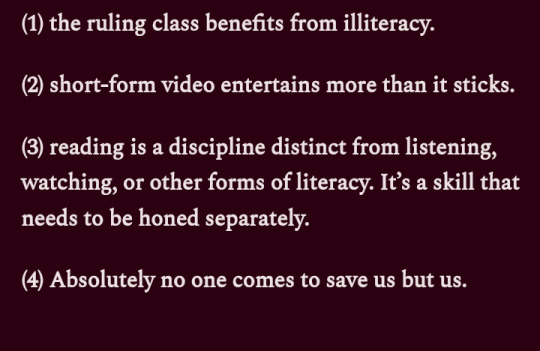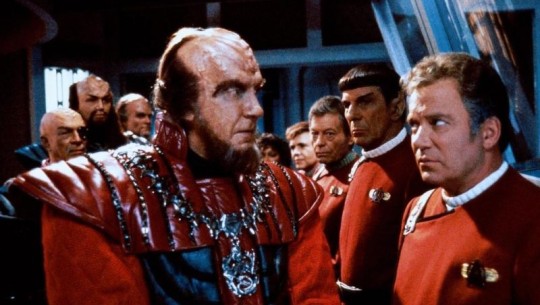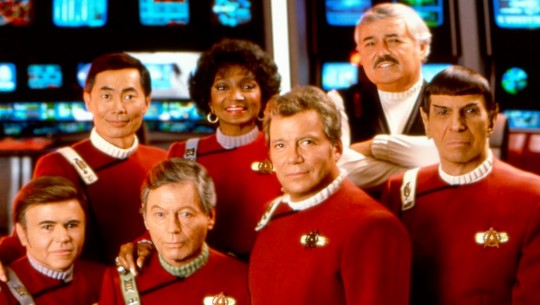#although you have not experienced Shakespeare until you have read him in the original Klingon
Explore tagged Tumblr posts
Text
Be really careful about excluding other forms of consuming media as somehow "not enough" compared to reading, because that's an ableist narrative.
Other totally valid ways to consume books:
being read to
audiobooks (as above but someone's paid to do it)
the movie version (may differ, but stories are allowed to be enjoyed in different ways)
braille
modern translations
other language translations
digitally (lots of people can't hold up the weight of a book!)
summary/edited/shorter versions for people with mental health issues and/or cognitive impairments
Because yes, the ruling class benefits from illiteracy, but it also really benefits from abled, health-privileged, and classist people from looking down their noses at people who have different needs and preferences.
If you think reading text is the only legitimate (or even the always-preferred) way to participate in stories, block me now. And I say this as a writer of books.

"Absolutely no one comes to save us but us."
Ismatu Gwendolyn, "you've been traumatized into hating reading (and it makes you easier to oppress)", from Threadings, on Substack [ID'd]
#everyday ableism#fuck ableism#fuck classism#fuck faux leftism that leaves out disabled and other different needs#sometimes the performance is better#Shakespeare for instance was meant to be viewed not read but both are valid#although you have not experienced Shakespeare until you have read him in the original Klingon#hell yeah I can make this about Star Trek#are you going to tell La Forge to his face that it doesn't count unless he reads text when his VISOR is off
151K notes
·
View notes
Text
Star Trek VI: The Undiscovered Country (1991) Review

[This review includes spoilers.]
Spock: "There is an old Vulcan proverb: only Nixon could go to China."
The common wisdom among Trekkies is that the even-numbered Star Trek movies are good and the odd numbered movies suck. There's actually something to this theory. Star Trek VI: The Undiscovered Country is a good movie that works on three levels: as a step toward aligning the Original Series mythology with Next Gen, as a farewell for the Original Series cast, and as an enjoyable Star Trek adventure in its own right. It looks especially good in contrast to its predecessor, the "let's pretend it never happened" fifth movie.
The plot centers on the Khitomer Accord, the crucial event that brought peace with the Klingons and eventually allowed a guy named Worf to serve on the bridge of the Enterprise D a few years in the future. But like the II-IV trilogy, this movie was also about growing older. The proverbial "undiscovered country" is the future, and our heroes were being pushed into retirement so that younger adventurers could take their place and start boldly going where no one had gone before. Sadly, I noticed when watching the first six movies in close succession that this movie is where they start showing their age in a big way. Shatner in particular looked tired, gray and overweight, a bit too old to carry the lead in an action movie, bless his heart.
(Although Sulu, the youngest member of the original series cast, got his own command and looked ready, able and willing to take the helm of a spinoff. It's too bad he didn't get one.)
This adventure did give some satisfying closure to Kirk as a character. He was forced reluctantly to lead the effort to make peace with a people he hated. Early in the movie, most of the cast were denigrating Klingons as subhuman in an uncomfortable echo of race prejudice. By the end, Kirk internalized that the "Klingon bastard" who killed David was an individual, and not all Klingons are bastards. This core message -- that it is ignorance that makes one see "the other" as evil -- has always been one the strengths of the original series. We're all "human," even if we're not all homo sapiens.
The Undiscovered Country included some strong guest stars, primarily David Warner as Chancellor Gorkon of the Klingon High Council, who didn't get enough scenes, and Christopher Plummer as General Chang, who probably got too many. (Great eyepatch, though. It looked like it was screwed into his head.) We got Michael Dorn playing Worf's ancestor the defense attorney, and Rene Auberjonois (pre Deep Space Nine) as a Starfleet officer. There was even a character named Dax, although he was most certainly not a Trill, Kurtwood Smith as the Federation president with rather amazing long white hair, and Christian Slater for about a minute.
We weren't quite as fortunate with the female characters. Kim Cattrall gave a forgettable performance (I certainly forgot it) as Lt. Valeris, who was mostly notable for her stupid hairdo and the fact that she wasn't Saavik. Iman played the shapeshifting alien Martia, a forgettable character, whom I'll admit had her moments.
The movie ended with the written signatures of the cast members, which I thought was just lovely. It was the perfect end to the adventures of the Original Series cast. Too bad it wasn't actually the end for all of them.

Bits and pieces:
-- Star date 9521.6. The action took place mostly on Enterprise, Starfleet HQ, and various Klingon locations that I didn't quite track.
-- The Klingon moon Praxis was destroyed and the entire Klingon civilization nearly along with it because of a lack of safety measures. I could make a contemporary political comment about this, but I won't.
-- Because the budget was slashed after the debacle that was Star Trek V: The Final Frontier, they used redressed Next Gen sets for much of this movie.
-- Janice Rand again showed up, this time as Sulu's communications officer.
-- Thanks to the chameloid, we got Kirk fighting himself again. That was like a petit homage to the Original Series.
-- As a plot point it was rather cool, but the lavender blood looked a bit ridiculous. Especially since there was so much of it.
-- McCoy was a ship's surgeon for 27 years. That's quite a career.
Quotes:
Chekov: "Guess who's coming to dinner?"
Gorkon: "The undiscovered country." Spock: "Hamlet, act 3, scene 1." Gorkon: "You've not experienced Shakespeare until you have read him in the original Klingon." Chang: "Ach ah, ach beh!" (My Klingon spelling sucks. Feel free to correct me.)
Chang: "In space, all warriors are cold warriors." Plus, no one can hear you scream.
Chang: "We need breathing room." Kirk: "Earth. Hitler. 1938."
Kirk: "I'm going to sleep this off. Please let me know if there's some other way we can screw up tonight."
Martia: "That was not his knee. Not everybody keeps their genitals in the same place, captain."
Kirk: "Once again, we've saved civilization as we know it." McCoy: "And the good news is, they're not going to prosecute."
This was the last appearance of the entire original series cast together, and it was nice that they went out on a positive note. Three out of four sets of Starfleet dishes.
Billie Doux loves good television and spends way too much time writing about it.
#Star Trek#Star Trek VI#Star Trek VI: The Undiscovered Country#James T. Kirk#Spock#Leonard McCoy#Star Trek Reviews#Doux Reviews#Movie Reviews#something from the archive
4 notes
·
View notes